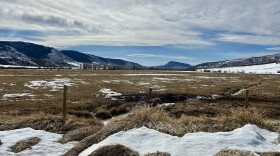-
The Fetcher ranch in northwest Colorado is on the frontlines this year of record-low snowpack across the West. It's adding a sense of urgency among seven states to finalize a plan for how to conserve the dwindling Colorado River.
-
Four days of negotiations in a Salt Lake City conference room earlier this month did not appear to have sparked a breakthrough.
-
Experts say the federal government does not want to be the decision maker, and is pushing states to come to an agreement on future water use that will inform the river's post-2026 operating guidelines. CU Boulder's Chris Winter weighs in on the Interior's draft environmental impact statement.
-
Warmer temperatures in November meant that less snowpack accumulated. But storms did increase soil moisture in the Upper Colorado River Basin, making future precipitation more likely to run off slopesides and boost rivers and streams.
-
Drought and steady demand along the Colorado River are draining the nation's second-largest reservoir. Land that was once submerged is now full of beavers and thriving ecosystems.
-
This past water year was dry, with not all of the snowpack making it into the basin's rivers and streams. Forecasters will be looking out for conditions driven by climate change and prolonged drought as they consider what Water Year 2026 will bring.
-
The Bureau of Reclamation has lowered Navajo Dam releases from 650 to 500 cfs to support endangered fish habitat along the San Juan River. Flows will remain within recovery program targets, with adjustments possible based on conditions.
-
Drought conditions in the Rocky Mountains could further lower water levels at Lake Powell.
-
The Lower Basin states of California, Arizona and Nevada are asking for a fresh look at proposals for sharing the shrinking water supply and changes to Lake Powell and the Glen Canyon Dam.
-
Colorado River activists are calling on the federal government to rework the plumbing on one of its biggest dams. And President Biden signed an executive order on Wednesday that he says will make it easier for people to travel to other states for abortions.

Play Live Radio
Next Up:
0:00
0:00
Available On Air Stations









